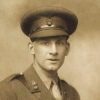Siegfried Sassoon

Siegfried Sassoon
Siegfried Loraine Sassoon, CBE, MCwas an English poet, writer, and soldier. Decorated for bravery on the Western Front, he became one of the leading poets of the First World War. His poetry both described the horrors of the trenches, and satirised the patriotic pretensions of those who, in Sassoon's view, were responsible for a jingoism-fuelled war. Sassoon became a focal point for dissent within the armed forces when he made a lone protest against the continuation of the war in...
NationalityEnglish
ProfessionPoet
Date of Birth8 September 1886
December stillness, teach me through your trees That loom along the west, one with the land, The veiled evangel of your mysteries. While nightfall, sad and spacious, on the down Deepens, and dusk embues me where I stand, With grave diminishings of green and brown, Speak, roofless Nature, your instinctive words; And let me learn your secret from the sky, Following a flock of steadfast-journeying birds In lone remote migration beating by. December stillness, crossed by twilight roads, Teach me to travel far and bear my loads.
If I were fierce, and bald, and short of breath, I'd live with scarlet Majors at the Base, And speed glum heroes up the line of death.
I believe that this War, on which I entered as a war of defence and liberation, has now become a war of aggression and conquest.
His most rational response to my attempts at drawing him out about literature and art was 'I adore italics, don't you?'
And it's been proved that soldiers don't go mad Unless they lose control of ugly thoughts That drive them out to jabber among the trees.
In the years 1910 and 1911 I had 51 innings with 10 not outs and an average of 19. This I consider a creditable record for a poet.
I didn't want to die - not before I'd finished reading The Return of the Native anyhow.
His wet white face and miserable eyesBrought nurses to him more than groans and sighs:But hoarse and low and rapid rose and fellHis troubled voice: he did the business well.(First verse of Died of Wounds)
O German mother dreaming by the fire, While you are knitting socks to send your son His face is trodden deeper in the mud.
If I were fierce, and bald, and short of breath,I'd live with scarlet Majors at the Base,And speed glum heroes up the line of death.
October's bellowing anger breakes and cleavesThe bronzed battalions of the stricken woodIn whose lament I hear a voice that grievesFor battle's fruitless harvest, and the feudOf outrage men. Their lives are like the leavesScattered in flocks of ruin, tossed and blownAlong the westering furnace flaring red.O martyred youth and manhood overthrown,The burden of your wrongs is on my head.
EVERYONE suddenly burst out singing; And I was filled with such delight As prisoned birds must find in freedom, Winging wildly across the white Orchards and dark-green fields; on—on—and out of sight. Everyone’s voice was suddenly lifted; And beauty came like the setting sun: My heart was shaken with tears; and horror Drifted away ... O, but Everyone Was a bird; and the song was wordless; the singing will never be done.
Man, it seemed, had been created to jab the life out of Germans.
I am not protesting against the conduct of the war, but against the political errors and insincerities for which the fighting men are being sacrificed.